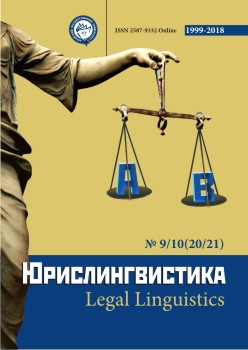DISCUSSION ABOUT RIGHTS OF NATIONAL MINORITY AS THE OBJECT OF FORENSIC SCIENCE
Abstract
The article expounds forensic practice of texts dedicated to inter-ethnic relations between Tatars and Russians and reactive texts dedicated to state national policy. The authors attention is drawn to the problem of distinguishing between legitimate protection of Tatars' rights from extremist actions. Authors are explaining peculiar origins of inter-ethnic conflict by discribing its stages of development in history. Features of national opposite discourse are described. The article reveals specificity of conflict between national minority and power of Kremlin. The nowadays situation in socio-political sphere in Tatarstan Republic is discribed. Theoretical basis of text research within the intergroup conflict is given. The concepts of "ethnos", "ethnic identity", "relative deprivation", "social setting" are explicated, the methods of providing psychological influence on the addressee are described. The article also adduces the technology for the complex forensic psychological and linguistic study of materials reflecting intergroup conflict interaction. Several groups of materials provided for the forensic examination are identified in accordance with the presence or absence of signs of extremist values as well as the matter of the actual addressee of text (representatives of state authorities, opponents in intergroup conflict or representatives of a "foreign" ethnic group.) When analyzing such materials, it is proposed to distinguish the main subject which the material is devoted to (it could be group of persons, discription of action or some ideology), the attitude of the author to the subject, and the author’s communicative purpose. The authors pay attention to the difficulties that may arise during the forensic studies and, relying the personal experience at this field, suggest ways to overcome them. At the same time, they distinguish linguistic and psychological features of materials containing so-called “extremist meanings”.
Downloads
References
Гришина Н. В. Психология конфликта. СПб., 2008.
Договор Российской Федерации и Республики Татарстан «О разграничении предметов ведения и полномочий между органами государственной власти Российской Федерации и органами государственной власти Республики Татарстан» от 26.06.2007. URL: http://www.gossov.tatarstan.ru/dokument/dogovor/fzrfrt/dogovor/.
Кузнецов С. А. Большой толковый словарь русского языка: А-Я. СПб., 1998.
Кукушкина О. В., Сафонова Ю. А., Секераж Т. Н. Методика проведения судебной психолого-лингвистической экспертизы материалов по делам, связанным с противодействием экстремизму и терроризму. Москва, 2014.
Практикум по социальной психологии/ под ред. И. С. Клециной. СПб., 2008.
Татарская энциклопедия: В 6 т. / Гл. ред. А. М. Мазгаров, ответ. Ред. Г. С. Сабирзянов. – Казань, 2014. – Т. 6: У – Я.
Федеральный закон от 24 июля 2007 г. N 199-ФЗ "Об утверждении Договора о разграничении предметов ведения и полномочий между органами государственной власти Российской Федерации и органами государственной власти Республики Татарстан". URL: http://tatarstan.ru/documents/polnomochia.htm.
Якупова В. А. 100 историй о суверенитете. – Казань, 2001.
REFERENCES
Grishina N. V. Psychology of Conflict. Saint-Petersburg, 2008.
The Agreement between Russian Federation and Republic of Tatarstan “On the delimitation of the subjects of competence and powers between the state authorities of the Russian Federation and the state authorities of the Republic of Tatarstan”, 26.06.2007. URL: http://www.gossov.tatarstan.ru/dokument/dogovor/fzrfrt/dogovor/.
Kuznecov S. A. The Great Dictionary of Russian language. Saint-Petersburg, 1998.
Kukushkina O. V., Safonova Yu. A., Sekerazh T. N. Methodology of forensic psychological and linguistic examination of materials in cases involving countering extremism and terrorism. Moscow, 2014.
Workshop on social psychology / edited by Kleckina I. S. Saint-Petersburg, 2008.
Tatar Encyclopedia: in 6 V. Kazan, 2014. Vol. 6.
Federal law of July 24, 2007 N 199-FZ "On approval of the Treaty on the delimitation of competencies and powers between the state authorities of the Russian Federation and the state authorities of the Republic of Tatarstan". URL: http://tatarstan.ru/documents/polnomochia.htm.
Yakupova V. A. 100 stories about sovereignty. Kazan, 2001.
Copyright (c) 2018 Диля Ханзафарова, Ильдар Равильевич Абитов

This work is licensed under a Creative Commons Attribution 4.0 International License.
The authors, which are published in this journal, agree to the following conditions:
1. Authors retain the copyright to the work and transfer to the journal the right of the first publication along with the work, at the same time licensing it under the terms of the Creative Commons Attribution License, which allows others to distribute this work with the obligatory indication of the authorship of this work and a link to the original publication in this journal .
2. The authors retain the right to enter into separate, additional contractual agreements for the non-exclusive distribution of the version of the work published by this journal (for example, to place it in the university depository or to publish it in a book), with reference to the original publication in this journal.
3. Authors are allowed to post their work on the Internet (for example, in a university repository or on their personal website) before and during the review process of this journal, as this may lead to a productive discussion, as well as more links to this published work (See The Effect of Open Access).










